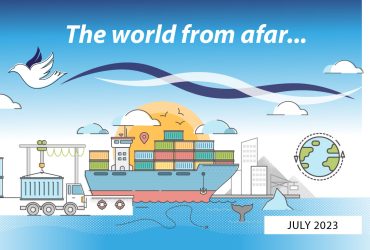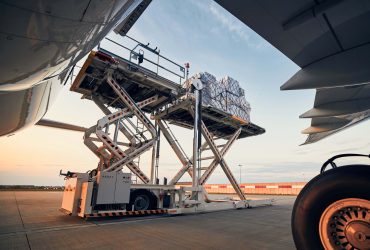Monthly Freight Roundup – May 2023
In a month where Etihad Railways confirmed completion of the UAE’s national rail network and Bournemouth Airport celebrated the launch of new cargo flights to China, the supply chain and logistics industry has seen a huge amount of change.
Elsewhere around the world, South Korea revealed new container shipping links with Russia, and Hong Kong International Airport officially opened an air-conditioned facility for cold chain e-commerce shipments. That’s not all though. Here, we look back at some of the biggest news stories in the sector.
Soaring temperatures limit canal shipping
While in the UK, we might have been enjoying the rising temperatures over the past few weeks, this has unfortunately had a huge impact on shipping around the world. More specifically, along the Panama Canal, which has been hit by a drought, restrictions have been put in place to limit the amount of cargo that vessels can carry.
As of 30th May, ships travelling through the canal will only be allowed drafts of up to 13.41m which could see up to 40% less cargo for some passing vessels. If a ship is found to be over the limit, fees of up to $500 will be effective from 1st June.
This latest challenge comes after the same canal was blocked in 2021 when the Ever Given carrier became stuck for almost one week. In other news, the Suez Canal Authority announced at the end of May that it had officially refloated the previously stuck bulk carrier.
Political unrest continues
Polish officials have confirmed that freight vehicles registered in Russia or Belarus will not be permitted to enter through its Belarus border from 1st June. It’s not confirmed whether this will apply to Poland’s Russia border.
Elsewhere, the combat across Sudan continues to hit supply chains with cargo bookings and air connections for the African nation being suspended. It comes after the war in Ukraine has also caused huge disruption to several cargo routes.
More recently, Ukraine officials have accused Russian officials of preventing Ukrainian ports from handling Black Sea grain exports. In July 2022, the Black Sea Deal was brokered whereby the export of fertiliser and food from the Ukrainian ports of Odessa, Chornomorsk and Pivdennyi was covered.
The agreement states that ships should be inspected by Russian, Ukrainian, Turkish and UN inspectors, but Ukraine claims that Russian inspectors haven’t fulfilled their obligations since 29th April. Russia has threatened not to renew the deal.
The UK welcomes the world’s biggest container dock
At the end of May, the Port of Felixstowe saw the largest container ship in the world docked for the first time. With a capacity of 24,346 TEU, the vessel is officially bigger than the OOCL Spain, which previously held the title for the world’s biggest container vessel, with a capacity of 24,188 TEU.
The arrival of this ship was slightly delayed due to brisk winds, but the vessel is still scheduled to leave the Port of Felixstowe on 1st June.
Freight trends are on the up and inflation is going down
Chief Economist Torsten Sløk got everyone talking at the weekend thanks to his supply chain presentation which rounded up the sector. It can’t be denied that the past few years have been challenging – with Covid-19, political instability and a lack of fore planning having an exponential impact on global shipments. But Torsten believes this is coming to an end.
Evaluating current statistics, including the cost of sending containers between China and the US, as well as the time it takes to unload a ship, and even the price for renting out a full cargo ship, Torsten concluded that “supply chains are basically healed, which… will help subdue inflation.”
While difficulties within our global supply chains can’t fully be attributed to the current inflation, experts have agreed that combating issues within this sphere would help bring everything back into balance.
Sustainable supply chains have got everyone talking
Mid-May we were met with the news that the biggest exporter of Scotch Whisky would be using an electric vessel to ship its goods for the first time ever. This move alone would cut the group’s carbon emissions by 155 tonnes per annum. It comes as a spokesperson for the Scottish Port of Aberdeen announced that they would be targeting net zero emissions from ships visiting the port and would also be spending £55m in the next 10 years to become the UK’s first net zero port by 2040.
But Scotland isn’t the only country turning its attention to environmentally-friendly shipping. This month, we also heard that California would be ending sales of new diesel vehicles from 2036 and, elsewhere in the US, officials have begun a $4billion investment to electrify ports and reduce carbon emissions.
Furthermore, another project has begun at the Port of Rotterdam to enable zero emission transport. The Port along with five others want to see the first hydrogen-run vessel in 2025 as well as 50 zero-emission vessels by 2023. The Climate Action Plan has also proposed a 10% reduction in emissions from road transport in the next seven years.
Over in New Zealand, officials have confirmed a move towards coastal and rail shipping which could drastically reduce carbon emissions.
Technological advancements level up supply chains
An airfreight service between China and Liege has become the first in the world to trial a brand-new e-freight programme, led by the International Air Transport Association (IATA). It was confirmed that the One Record Programme witnessed the first use of radio frequency identification technology within the sector, which automatically pushes cargo status in real-time.
Not only does this make the exchange of information much smoother but it could open the door to new opportunities for innovative services and business models within the supply chain industry.
In other news, an app which is designed to combat supply chain theft and fraud has officially been launched. It’s hoped that once rolled out, the app will allow every organisation in the supply chain to manage their risk effectively as well as save on costs associated with lost and stolen goods.
A new demand for supply chain managers
Recent statistics have shown a surge in hiring supply chain professionals in multinational companies. In the US, supply chain manager job postings more than doubled on LinkedIn between 2019 and 2022. In the UK, postings for supply chain managers on Indeed increased by 22% from 2019 to 2021.
It comes as a series of crises and disruptions within global trade and logistics have meant that supply chain topics are now the focus of many boardroom meetings. What’s more, not only has the conversation been sparked but businesses are increasingly realising the risk of cutting their supply chain costs. Instead, they are searching for ways to make their supply chain more resilient by investing in senior professionals to identify any potential issues before they become a bigger concern.
And that’s a wrap
We’ll be back at the end of June with another market update. In the meantime, if you have any questions about the stories covered above or need support with your current supply chain, please get in touch.


